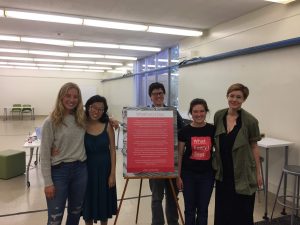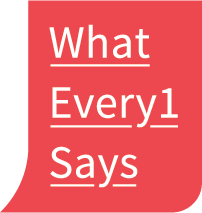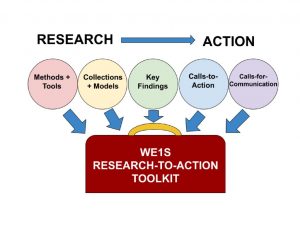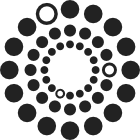Director: Abigail Droge
Latest Curriculum Lab Post
Reading Communities: The Social Life of Literature in a Time of Social Distancing (April 2020)
As a way of documenting the experience of teaching during COVID-19, I want to share the WE1S-affiliated class that I am currently adapting to an online format: “Reading Communities: The Social Life of Literature.”
The topic of “reading communities” has been a surprisingly poignant one to examine within a quarantined environment. I ask my students to consider reading not as a solitary act, but as a social one – a foundation for community-building, even when we are physically separated… (read more)
Welcome to the Curriculum Lab, a home for WE1S materials and practices centered on student experiences of the humanities in higher education. The Curriculum Lab has four main areas of focus: 1) A Pedagogy Blog, documenting WE1S-affiliated courses, 2) Big Data Research, 3) Human Subjects Research, such as surveys and focus groups, and 4) Engagement Resources, such as Research-to-Action Toolkits, for both Students and Teachers. Scroll down to learn more about each one!
Our goal is to unite scholarship and pedagogy in the same conversation. We start from the premise that if we put the conceptual issues raised by our project in dialogue with our teaching practice, the two can mutually inform one another. How might knowing “What Everyone Says” about the humanities change our own frames of reference as humanities advocates in the classroom? And conversely, how might we interpret and act upon our project’s digital research results in light of our own teaching experiences?
Present and past participants in the WE1S Curriculum Lab include: Abigail Droge (Director), R. Baker, Leila Stegemoeller, Jessica Gang, Helen Foley, Avery Martin, Chloe Willis, Raymond Steding, Joyce McGee Brummet, Aleah Kiley, Mauro Carassai, and Sam Cline.
WE1S Curriculum Lab Pedagogy Blog
The Curriculum Lab contributes regularly to the WE1S Research Blog, giving live reports from ongoing courses and providing reflections on the intersections between the conceptual work of the project and the practical opportunities and challenges of teaching. The resources and reflections here are meant to act as a pedagogical laboratory running alongside the WE1S project and providing a tandem venue in which to work through our core issues.
Full archive of Curriculum Lab blog posts
Individual Posts by Abigail Droge:
- An Introduction to the WE1S Curriculum Lab
- Five Principles for Teaching Humanities Advocacy
- Reading with Scientists: Syllabus Design
- Reading with Scientists, Week 1: Beginning with Frankenstein
- Reading with Scientists: Frankenstein and CRISPR
- Reading with Scientists: Annotate. Advocate.
- Reading with Scientists: Victor Frankenstein, College Student
- Reading with Scientists: Students Imagine New Ways to Teach Literature
- Reading with Scientists: Isaac Asimov and Driverless Cars
- Reading with Scientists: Students Become Editors to Inspire Interdisciplinary Exchange
- Reading with Scientists: Ursula Le Guin’s Omelas and the Dystopia of Big Data
- Reading with Scientists: The Time Machine and Environmental Science
- How to Solve Problems with Books: Syllabus Design
- How to Solve Problems with Books: Explaining Ourselves to the Victorians
- How to Solve Problems with Books: Advice from the Victorians
- How to Solve Problems with Books: Creating a Five-Year Plan with the Victorians
- How to Solve Problems with Books: Archives and Advocacy
- How to Solve Problems with Books: Voices of Industrialism
- How to Solve Problems with Books: Final Showcase
- Reading in Santa Barbara: Syllabus Design
- Reading in Santa Barbara, Past: Finding Archival Communities
- Reading in Santa Barbara, Present: Students Plan a Public Humanities Showcase
- Reading in Santa Barbara, Future: Building the Utopian University
- Reading Communities: The Social Life of Literature in a Time of Social Distancing
Big Data Research on Student Discourse around the Humanities and Liberal Arts
The Curriculum Lab uses digital methods such as topic modeling to analyze student discourse around the humanities and liberal arts, ranging from college newspapers to social media. This research allows us to get a bird’s-eye-view of what students talk about when they talk about the humanities. We are hand-labeling documents with “tags” to help us track the discourse associated with different kinds of institutions, such as public colleges, private colleges, doctoral universities, liberal arts colleges, and community colleges. Modeling large collections of articles can also guide our reading, helping us to engage more closely with student writing on specific topics of interest.
Resources:
- Collection 14: US student newspaper articles, containing the keywords “humanities” or “liberal arts”
- Collection 14 Start Page
- Topic Model of Student Discourse
- Landscape of student discourse around the humanities and liberal arts (topic model exploration)
- A Digital Humanities Study of Reddit Student Discourse about the Humanities, blog post by Raymond Steding
- Grounded Theory Methodologies blog post by R. Baker
Human Subjects Research (Surveys and Focus Groups)
In the Spring of 2019, members of the Curriculum Lab team conducted human subjects research (consisting of surveys and a series of focus groups) at UCSB to understand how people across campus, including undergraduates, graduate students, faculty, and staff, experience the humanities. This research, focused on our own immediate community, is meant to complement our digital analysis of student discourse from campus newspapers across the US. The ethnographic methods offered by human subjects research allow us a more intimate picture of the humanities in a tight-knit, local community; such a “close reading of a campus” can ground the “distant reading” of our larger data sets. Fellow WE1S team members conducted similar research at the University of Miami in Spring 2020.
Resources:
- Human Subjects Research webpage (contains links to survey questions, methods card, etc)
- Announcing WE1S Human Subjects Research, blog post by Jessica Gang
- Human Subjects Research Portfolio, Avery Martin (to come)
Preliminary Key Findings:
- Students are twice as likely to think others stereotype them based on their majors than that they stereotype others
- Students’ personal and academic commitments to the humanities don’t always align; extracurriculars provide flexible space for engagement

Curriculum Lab team members (Avery, Jessica, Rebecca, Abigail, and Leila) conducting human subjects research at UCSB in Spring 2019
Research-to-Action Toolkits for Students and Teachers
Based on our research, the Curriculum Lab aims to compile resources for both students and teachers, providing suggested ways to “activate” our findings and engage with the humanities in your own community. To this end, we are developing two “Research-to-Action Toolkits.” The first is meant for an audience of Student Writers and Journalists. This toolkit builds from our study of student discourse, such as student journalism from campus newspapers across the US, to suggest new ways for students to produce discourse around the humanities and liberal arts. The second toolkit is intended for Teachers and adapts WE1S materials for the classroom. This toolkit focuses on providing ideas and strategies for “teaching with topic models” and “teaching with toolkits.” Both toolkits are currently in development – stay tuned!
A key premise of these Research-to-Action Toolkits is that public humanities advocacy starts with the students and teachers who engage with the humanities daily, in the classroom, through extracurriculars, and through research. Our rationale is that WE1S research and recommendations apply most immediately within the academy itself as a theater for public humanities; by being self-reflective about our own educational practices, we can do a great deal towards shaping the present and future of the humanities. We view humanities advocacy not as advocacy for a narrowly-defined set of disciplines but as a much larger educational project — many of our recommendations focus on ways of increasing interdisciplinary dialogue and engaging with STEM fields, for instance. By starting local and addressing questions in our own community, we hope to be able to share ideas and actions that can be adapted and scaled for different audiences and contexts.
Sneak peak on how to take research-based action!
Teaching with WE1S Materials
WhatEvery1Says materials can have a powerful effect in the classroom. For example, working with a topic model can help students to engage with digital tools and methods, while learning how to understand both the potentials and the limitations of a dataset. Prompting the class to write their own Key Finding and Action Cards can also help students to communicate complex concepts succinctly and powerfully to an external audience, a crucial skill in today’s digital environment.
In Spring 2020, Dr. Abigail Droge incorporated a WE1S unit into her class “Reading Communities: The Social Life of Literature” (English 165RC at UC Santa Barbara). Students analyzed a topic model of student newspaper articles containing the words “humanities” or “liberal arts,” and they worked in teams to create their own Research-to-Action Toolkits. See below for sample teaching materials, as well as examples of student work.
Sample Teaching Materials [to come]
WE1S-Affiliated Courses
Several members of the WE1S team have taught affiliated courses on themes such as the Public Humanities, the relationship between the humanities and other disciplines, the history of the humanities, and Digital Humanities methodology.
English 525DH: Graduate Seminar in Digital Humanities
CSUN, Fall 2018
Scott Kleinman
This course provides an introduction to the questions and methods used in the field of Digital Humanities (DH) with a special emphasis on the study of literary and other textual materials. The course embraces the project-based approach prevalent in the Digital Humanities, in which students are active participants in high-level scholarly research. As part of their participation in the course, students will contribute to one of two ongoing multi-institutional research projects, WhatEvery1Says, or the NEH-funded Lexomics project for literary text analysis. The aim will be to provide students with the opportunity to collaborate on cutting-edge DH projects that are not bound to traditional course assignments. Students will jump into projects already in progress, and will have the opportunity to continue to contribute after the end of the course. Both projects share commitments to the cultivation of digital methods of establishing meaning and to providing widened access to the methods they are exploring. Students will be charged with studying the scope of the projects and their place within the DH ecosystem, and they will as groups conceive of ways in which they can make a contribution to activities in process or extend the projects in new directions. The overall aim of the seminar is to foster the ability to learn by doing, to experience the production of scholarship at an advanced level, to students a greater stake in their work, and to provide an opportunity for them to make a lasting contributions to Digital Humanities knowledge and infrastructure.
English 148: Society, Culture, and Information
Reading with Scientists: How to Export Literature
UCSB, Fall 2018 and Fall 2019
Abigail Droge
This course considers an experiment: what would happen if we assigned literature in a science classroom? What questions, for instance, could a well-timed excerpt of Frankenstein help you to explore in an Artificial Intelligence course? We will discuss what is to be gained and lost by making literature more mobile. How would such a model of teaching ask us to rethink the lines that we draw between disciplines, or between general education requirements and specialized majors? For the final project, teams of students will work together to choose an audience they want to reach, an issue they want to address, and a text they want to “export” in order to address it. Our collective goal will be to compile an open-source collaborative portfolio of our ideas that can be shared with communities beyond our classroom.
Droge – Reading With Scientists – Syllabus – Fall 2018
This course is detailed in the Curriculum Lab Blog.
English 525DH: Graduate Seminar in Digital Humanities
CSUN, Fall 2019
Mauro Carassai
ENGL 525DH – Topics in English and Cultural Studies introduce students to foundational concepts and theoretical perspectives related to the specific ways in which literary studies – and the humanities disciplines at large – access, produce, and disseminate knowledge in digital environments. How s digital textuality challenging, enhancing, or reconfiguring the ways in which we produce and experience literary meaning? How are digital tools transforming our work as critics? How do we map topics of identity, communities, and multiplicities in large sets of various forms of representation and genres (narrative, poetry, fiction, visual art, multimodal texts) by means of digital visualization? The course looks at how the humanities organize meaning and build strategies for understanding, interpreting, and productively respond to a variety of both digitized and digital-born texts and places particular attention on increasingly established digital humanities practices such as distant reading and topic modeling. By means of user-friendly technologies, students in EGNL 525 are encouraged to investigate the relationship between literary texts and some of the contemporary practices of reading, writing, and experiencing meaning both in print and in networked and programmable media.
English 11: Literature and its Uses
Literature in the Real World: How to Solve Problems with Books
UCSB, Winter 2019 and Winter 2020
Abigail Droge
Should literature be applied to current social issues? If so, how? If not, why not? In this class we’ll consider the pros and cons of “solving problems with books” as we build a dialogue between major works of the Victorian era and pressing debates in the twenty-first century. Our particular focus will be the Industrial Revolution and its aftermath, including topics related to climate change, economic inequality, and education reform. Through readings of nineteenth-century British authors (which include William Wordsworth, Elizabeth Gaskell, Charles Dickens, George Eliot, Elizabeth Barrett Browning, John Ruskin, William Morris, and Oscar Wilde), we will ask whether “relevance” is the right question, or whether “art for art’s sake” is a valuable alternative. As a final project, we will put on a half theatrical/half analytic public colloquium, in which teams of students impersonate different Victorian figures and act as a “board of advisors” for current issues. What would Elizabeth Gaskell have to say about environmental policies? How would Charles Dickens implement an after-school tutoring program? Our main goal will be to discuss and debate whether or not we should take such advice, whether “advice” is an appropriate outcome of literary study, and what relationships we might draw between historical literature and present problems.
Droge – Uses of Literature – Syllabus Winter 2019
This course is detailed in the Curriculum Lab Blog.
English 197: Upper Division Seminar
Reading in Santa Barbara: Past, Present, and Future
UCSB, Spring 2019
Abigail Droge
How do we come to be studying literature in a UCSB classroom? What’s the difference between why we read at all and why we read in school? In this class, we will consider the historical interactions between reading communities, both inside and outside the university, in order to analyze present relationships between such communities and imagine future reconfigurations. As a class, we will undertake a sustained collaborative research project in Special Collections: a deep engagement with the archival records of UCSB’s own academic history. In partnership with UCSB Reads, the main goal of the course will be to curate a public humanities event (such as an exhibit, a talk, or a performance) around this year’s book, Thi Bui’s illustrated memoir The Best We Could Do. The final showcase will be informed by our archival research and should in some way model or foster the relationships that students want to see between reading communities of different demographics, backgrounds, and ages. In this way, students will be better able to reflect on what it means, has meant, and might mean to be a reader at UCSB.
English 197 – Reading in Santa Barbara – Droge – Final Syllabus – April 2019
This course is detailed in the Curriculum Lab Blog.
English 165RC: Topics in Literature
Reading Communities: The Social Life of Literature
UCSB, Spring 2020
Abigail Droge
We often think of reading as an activity done in solitude. This class asks us to reconsider literature as a radically social force and a building block for community, especially in a time of social distancing. How can reading help us to foster inclusive, supportive communities and collaborative practices? When does reading exclude? As we explore the power of literature to create – and sometimes break – social bonds, our course readings will move through three main units. We’ll begin with the UCSB Reads book for the year, Elizabeth Rush’s Rising: Dispatches from the New American Shore and discuss the ways that a shared book can form a basis for virtual communities at UCSB amidst the Coronavirus. An exciting partnership with an Environmental Studies course at UCSB, ES134: Coastal Processes and Management, taught by Dr. Ed Keller (also reading Rising) will help us to build interdisciplinary reading communities. Next, we’ll turn to the histories of communal reading practices, focusing on Victorian readers and learning about the forms and contexts in which they came together over literature in the nineteenth century. George Eliot’s novel, The Mill on the Floss, will help us to enact and adapt some of these community structures ourselves in our present moment. Finally, we will zoom out to take a big-data approach to our position as student readers. Drawing on tools and research from a digital and public humanities project here on campus, “WhatEvery1Says: The Humanities in Public Discourse,” we will analyze student discourse about the humanities from campus newspapers across the US, as well as in our own backyard at UCSB. As we use digital methods to identify community bonds that we might like to strengthen and gaps that we might help to fill, we will create toolkits and resources that hope to foster future collaborations and communities among students.
The WE1S Curriculum Lab is directed by Abigail Droge, a postdoctoral scholar with the WE1S project. Please address any communications to adroge@ucsb.edu. We’d love to hear from you!



